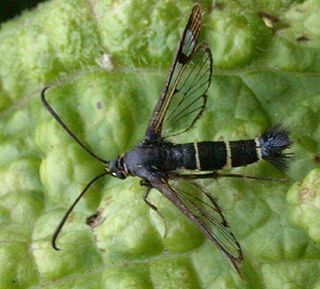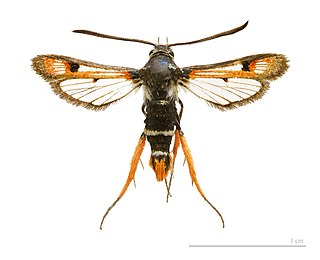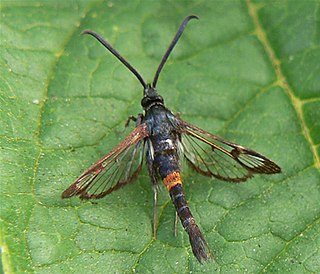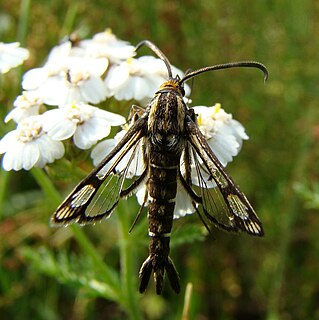Related Research Articles

The Sesiidae or clearwing moths are a diurnal moth family in the order Lepidoptera known for their Batesian mimicry in both appearance and behaviour of various Hymenoptera.

Sesioidea is the superfamily currently containing clearwing moths (Sesiidae), castniid moths (Castniidae) and little bear moths (Brachodidae). There is evidence from head and thoracic morphology that the first two families, internally feeding in plants as caterpillars, are sisters, whilst some brachodids are known to feed on leaf surfaces. Sesioidea are considered to be the sister group of Cossoidea which contain the also internal-feeding Goat and Leopard moths.

The hornet moth or hornet clearwing is a large moth native to Europe and the Middle East and has been introduced to North America. Its protective coloration is an example of Batesian mimicry, as its similarity to a hornet makes it unappealing to predators. The hornet moth has been linked to the large dieback of poplar trees across Europe because its larvae bore into the trunk of the tree before re-emerging as adults.

Synanthedon culiciformis, known as the large red-belted clearwing, is a moth of the family Sesiidae. It is found in the Palearctic and Nearctic realms.

Synanthedon myopaeformis is a moth of the family Sesiidae and the order Lepidoptera. In Europe it is known as the red-belted clearwing and in North America as the apple clearwing moth. The larvae create galleries under the bark of fruit trees, especially old trees with damaged trunks. During this process, the larvae cause significant damage to host trees. Particular attention has been paid to the damage they cause to apple trees. Their status as a pest of apple orchards has led to many research projects aimed at controlling populations of the moth. This moth is native to Europe, the Near East and North Africa. Recently, the moth was introduced into North America, being first detected in Canada in 2005. There are several organisms that threaten the larvae, including parasitoids, nematodes, and bacteria.

Synanthedon tipuliformis, known as the currant clearwing, is a moth of the family Sesiidae. It is endemic to the Palearctic realm, but is an invasive species in the Nearctic realm and the Australasian realm.

Synanthedon vespiformis, the yellow-legged clearwing, is a moth of the family Sesiidae. It is found in the Palearctic realm.

Bembecia ichneumoniformis, the six-belted clearwing, is a moth of the family Sesiidae.

Synanthedon bibionipennis, the strawberry crown moth, is a moth of the family Sesiidae. It is found in western North America from Montana south to Texas westward to the Pacific coast and from British Columbia to California. It is an introduced species in Hawaii.
Camaegeria is a genus of moths in the family Sesiidae. The genus was erected by Embrik Strand in 1914.

Synanthedon andrenaeformis, the orange-tailed clearwing, is a moth of the family Sesiidae. It is known from most of Europe. It is also present in the Near East.
Microsphecia brosiformis is a moth of the family Sesiidae. It is found from the Balkan Peninsula to the Crimea, southern Russia (Sarepta), Asia Minor, the Caucasus, Iran, Turkmenistan and Afghanistan.

Synanthedon stomoxiformis is a moth of the family Sesiidae. It is found in most of Europe and the Middle East.

Bembecia scopigera, the six-belted clearwing or glearwing, is a moth of the family Sesiidae. It is found from central Spain over most of south-western and central Europe, the Balkans, Greece, southern Russia and Ukraine to Turkey.

Pyropteron triannuliformis is a moth of the family Sesiidae. It is found from most of Europe to the Near East and Central Asia.
Chamaesphecia euceraeformis is a moth of the family Sesiidae. It is found from Spain and France through Italy and south-eastern Europe to the Caucasus.
Paranthrene insolita is a moth of the family Sesiidae. It is found in large parts of Europe, Turkey, Iraq, the Levant and the Palestinian Territories.